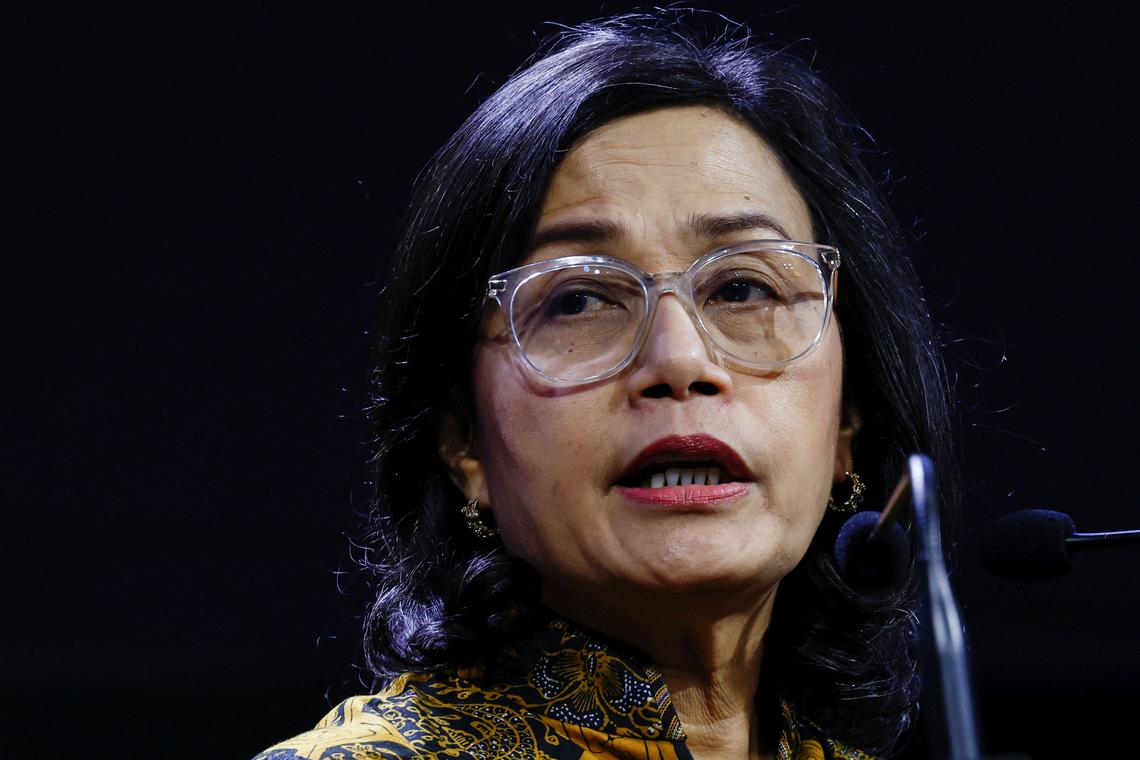JAKARTA – Indonesian Finance Minister Sri Mulyani Indrawati, long regarded as one of Asia’s finest finance ministers, is facing mounting pressure after a recent series of problems shook the economy.
Her prudent fiscal approach has put her at odds with President Prabowo Subianto, who is five months into his term and pushing for faster economic growth.
Glitches in Coretax, the country’s new digital tax administration system rolled out on Jan 1, have also contributed to an unexpected budget deficit early in the year.
Adding to the heat, the rupiah recently tumbled to its lowest level since 1998. On March 18, the main Jakarta Composite Index slid by as much as 7.1 per cent over investor concerns about Indonesia’s fiscal position and its growth prospects.
Speculation grew that Dr Sri Mulyani could resign, with whispers suggesting that she could be replaced by one of three people, including her deputy at the Finance Ministry – Mr Prabowo’s nephew, Mr Thomas Djiwandono.
But she told a news conference on March 18: “I am not resigning and will continue my role in safeguarding state finances.”
Dr Sri Mulyani served two terms as finance minister under former president Joko Widodo and was reappointed by Mr Prabowo in October 2024. She also served as finance minister between 2005 and 2010 under former president Susilo Bambang Yudhoyono.
She is under pressure to ensure that Mr Prabowo is able to fulfil his election promises, including growing the economy by 8 per cent each year later in his five-year term.
This would be a significant increase from the past decade’s mostly 5 per cent annual growth, and a bigger challenge now, as Indonesia’s economic expansion has slowed, and thousands have lost their jobs in the past months as local factories lost market share to cheaper, imported Chinese products.
This has led to a surprise interest rate cut by the central bank in January, and a sharp 24 per cent drop in the number of people travelling home to celebrate Hari Raya Aidilfitri in 2025 as they tighten their belts.
Among the populist measures Mr Prabowo is pushing hard for is a free-food programme for 82.9 million school students and pregnant women by the end of 2025, which would cost 171 trillion rupiah (S$13.83 billion) in 2025.
He also wants vast tracts of land in Papua province cleared to start food estates, such as for rice and sugarcane, to help Indonesia reach food self-sufficiency.
But the rupiah and stock market slid as market watchers grew skittish over whether the country’s already stretched finances can sustain these programmes, which have already led to widespread austerity measures.
It has not helped that Coretax, which cost 1.2 trillion rupiah and was meant to modernise tax filing, has left taxpayers struggling to log in, amid other errors and system crashes.
The tax office on Feb 10 revived the old online system while the Coretax system gets fixed.
Problems with Coretax contributed to a 30 per cent plunge in tax revenues collected by the government for the first two months of the 2025 fiscal year.
State revenue suffered a 21 per cent year-on-year decline.
Challenges such as the decline of commodity prices also translated into lower state revenues, said economist Dian Ayu Yustina from Jakarta-based Bank Mandiri. Indonesia is the world’s largest exporter of thermal coal, palm oil and nickel.
Compared with the size of the economy, Indonesia’s tax collection has shown a worrying decline over the past decade, the World Bank flagged in a March 2 report, with its performance falling behind those of neighbouring countries such as the Philippines, Malaysia, Thailand, Vietnam and Cambodia.
The Finance Ministry is deemed to have made little progress on improving the tax collection system and raising compliance during this period.
Dr Esther Sri Astuti, executive director of Jakarta-based Institute for Development of Economics and Finance (Indef), told The Straits Times: “Indonesia has always had a low tax-to-GDP (gross domestic product) ratio, and it is declining now to between 9 per cent and 10 per cent.”
The average tax-to-GDP ratio of Asia-Pacific countries is around 19 per cent, according to the Organisation for Economic Cooperation and Development.
The Finance Ministry has been criticised for Indonesia’s high cost of borrowing compared with its regional peers, such as the Philippines, which could indicate weak debt management on the part of the ministry, according to Dr Esther.
Yields on the benchmark 10-year Indonesian government bonds are at around 7 per cent, compared with about 6.2 per cent for the Philippines. Despite both nations having similar sovereign credit ratings, Indonesia’s yields on such bonds have almost always been higher since late 2022.
Dr Sri Mulyani on March 18 sought to give assurances that Indonesia’s economic fundamentals remain solid.
“The Finance Ministry continues to manage the state budget with prudence and professionalism,” she said.
But some think that now is not the time to be touting prudence.
The head of research at a Jakarta-based investment bank criticised Dr Sri Mulyani’s overly cautious stance on strategic projects that could spur the economy, as well as her ministry’s weak fiscal policy and lack of push in driving spending by provincial and municipal governments across Indonesia.
The Finance Ministry had a significant 45.4 trillion rupiah surplus from its 2024 budget, at a time when buying power was weaker on the ground, noted the analyst, who declined to be named as he was not authorised to speak to the media.
Had the government spent more, the liquidity that flowed into the economy could have boosted household spending and fuelled business growth.
“She is not pro-growth, and this is obviously not in line with President Prabowo’s ambitious economic growth target,” he said.
- Wahyudi Soeriaatmadja, who is based in Jakarta, has been Indonesia correspondent for The Straits Times since 2008.
Join ST’s Telegram channel and get the latest breaking news delivered to you.







